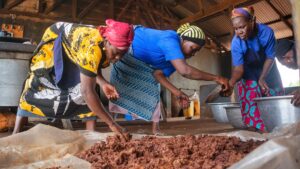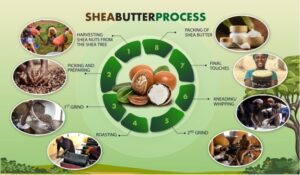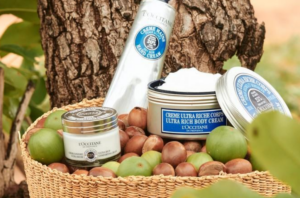The shea tree grows in the Savannah Zones ( Northern Region, Upper East Region, Upper West Region) as the climate in those regions are favourable for shea tree growth. Shea butter is a natural fat extracted from the nuts of the shea tree, which is native to West Africa. The butter is obtained by crushing, roasting, and grinding the nuts, then boiling and separating the oil from the solids. The resulting shea butter is a rich, creamy substance that is widely used in cosmetics, soaps, and other beauty products due to its moisturising and healing properties. Shea butter has been used for centuries in Africa for its medicinal and cosmetic benefits. It has been traditionally used for treating skin ailments such as eczema and psoriasis, and for protecting the skin and hair from the harsh climate and environmental conditions. Shea butter is also edible and can be used in cooking as a substitute for cocoa butter in chocolate production.
The Process of Shea Butter Production in Ghana
Shea butter production is a major source of income for many rural communities in the northern region, particularly for women who often have limited access to other forms of employment. According to the Global Shea Alliance, the shea industry in Ghana is estimated to employ over 600,000 women. The women who produce shea butter often work together in groups or cooperatives. They collect the shea nuts from the trees and process them by hand using traditional methods. This work is physically demanding and requires a lot of skill and knowledge, which is often passed down through generations. In addition to providing a source of income, shea butter production also has social benefits for women in northern Ghana. The work allows women to form strong bonds and support networks, and it often provides them with a sense of independence and empowerment. Women in the shea butter industry also face many challenges. The work is often labour-intensive and time-consuming, leaving little time for other activities such as education or caring for family members. Despite these challenges, the women who produce shea butter in Northern Ghana remain resilient and committed to their craft. They take pride in the quality of their products and the positive impact that their work has on their communities.
The Shea Butter Process
The process of making shea butter involves several steps. The basic steps are as follows:
- Harvesting: The nuts of the shea tree are collected from the ground after they fall from the tree or by harvesting the nuts directly from the branches.
- Preparation: The nuts are sorted to remove any debris or impurities, and then washed to remove any dirt or dust.
- Roasting: The nuts are roasted in order to help separate the nut from the outer shell. This can be done in a pot over an open flame or in an oven.
- Grinding: Once the nuts are roasted, they are crushed by hand using a mortar and pestle, or by using a mechanical press or grinder. This separates the nut from the shell and produces a paste-like substance.
- Kneading the paste: The paste is kneaded by hand or with a machine to help release the oil from the nut. This process can take several hours and requires a lot of physical effort.
- Boiling the oil: The oil is boiled to help remove any remaining impurities and to stabilize the oil. The oil is then cooled until it solidifies into a creamy butter.
- Filtering and packaging: The shea butter is filtered to remove any remaining debris and then packaged for use.
Why Global Brands Love Shea Butter from Ghana
Shea butter is a popular ingredient in many cosmetic, skincare, and hair care products, and is used by a wide range of companies around the world. Some of the big companies that use shea butter in their products include; L’Oréal, Nivea, The Body Shop, L’Occitane, Burt’s Bees, Dove etc. Shea butter’s moisturising and healing properties make it a popular and versatile ingredient that can be used to make some great DIY creations such as;
- Body lotions
- Moisturiser
- Lip Balm
- Wrinkle remover
- Sunscreen
- Shaving cream + many more
South West Six Ltd: Supporting Ethical Shea Butter Exports
At South West Six, we are committed to fair trade and ethical practices when working with women’s groups in Northern Ghana for Shea butter production. Our dedication to these principles is at the core of our business model. Here’s how we uphold fair trade and ethical practices:
- Empowering Women: We actively collaborate with women’s groups in the region, recognising their crucial role in Shea butter production. We prioritise partnerships that promote women’s economic empowerment, providing them with fair opportunities for employment and decision-making.
- Fair Wages, Market Access and Working Conditions: We ensure that the women involved in Shea butter production receive fair wages, which are determined through transparent negotiations and in alignment with industry standards. Additionally, we prioritise safe working conditions, providing a healthy and supportive environment for the women throughout the production process. Accessing markets is also crucial to women’s cooperative in this trade, so we ensure feedback is given on the need to produce quality shea butter and remain consistent on delivery. These points are always discussed with the management of the Shea butter production centre to ensure the working relationships are transparent. Organisations like the Ghana Export Promotion Authority (GEPA) play a key role in promoting Ghana’s non-traditional exports—including Shea butter—by supporting training, quality control, and international trade opportunities.
- Long-Term Relationships: We establish long-term relationships with the women’s groups, fostering trust, and mutual respect. This approach enables us to have a deeper understanding of their needs, challenges, and aspirations, and to work together towards sustainable development. With the feedback received, we can work on training needs, and additional support to ensure we are supporting adequately.
- Ethical Standards: We adhere to a set of ethical standards that guide our business operations. These standards encompass fair trade principles, respect for human rights, and compliance with local laws and regulations, respect of customs and culture within the Northern Ghana.
By upholding fair trade and ethical practices, we aim to create a sustainable and inclusive Shea butter industry in Northern Ghana.





